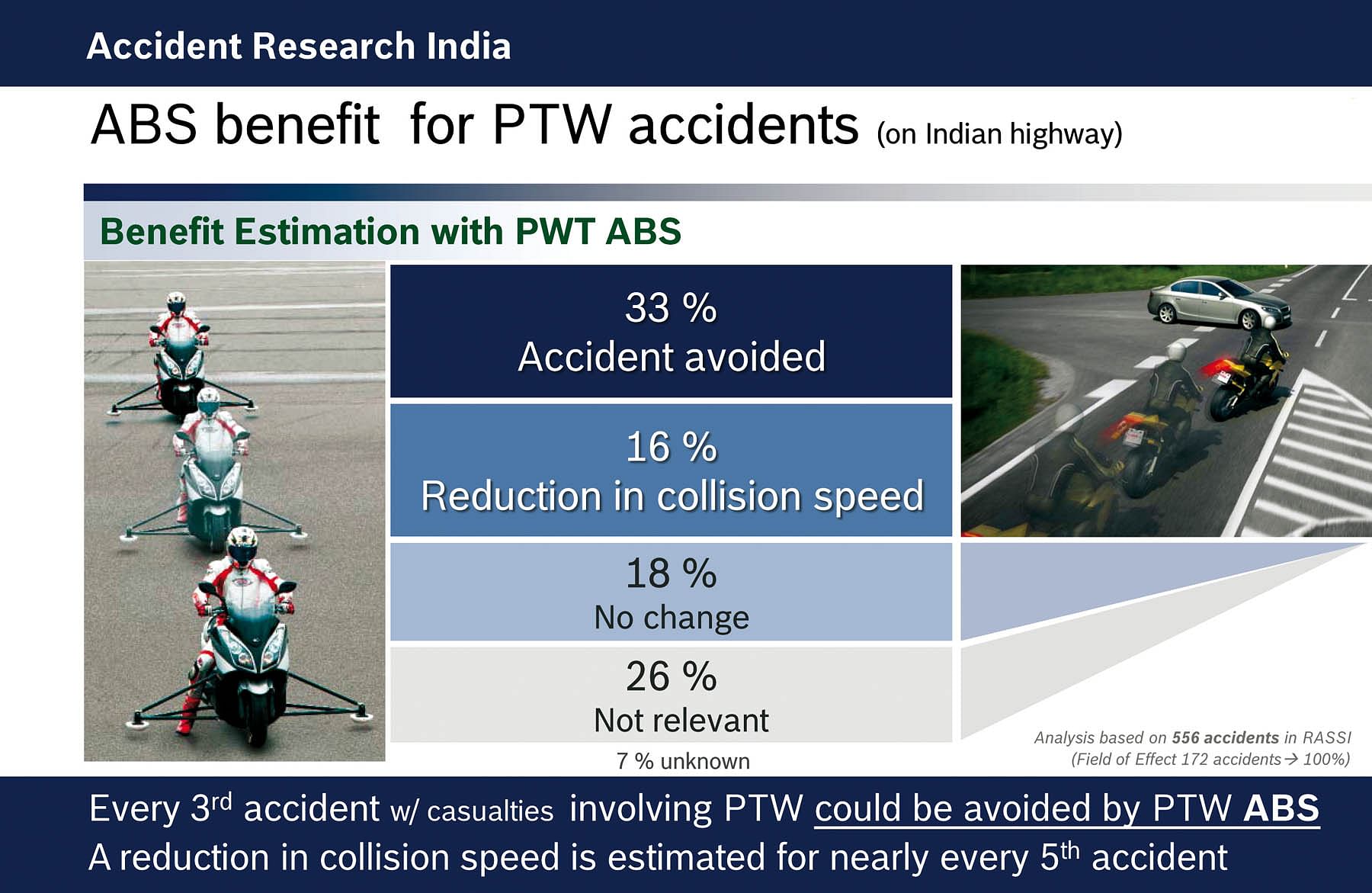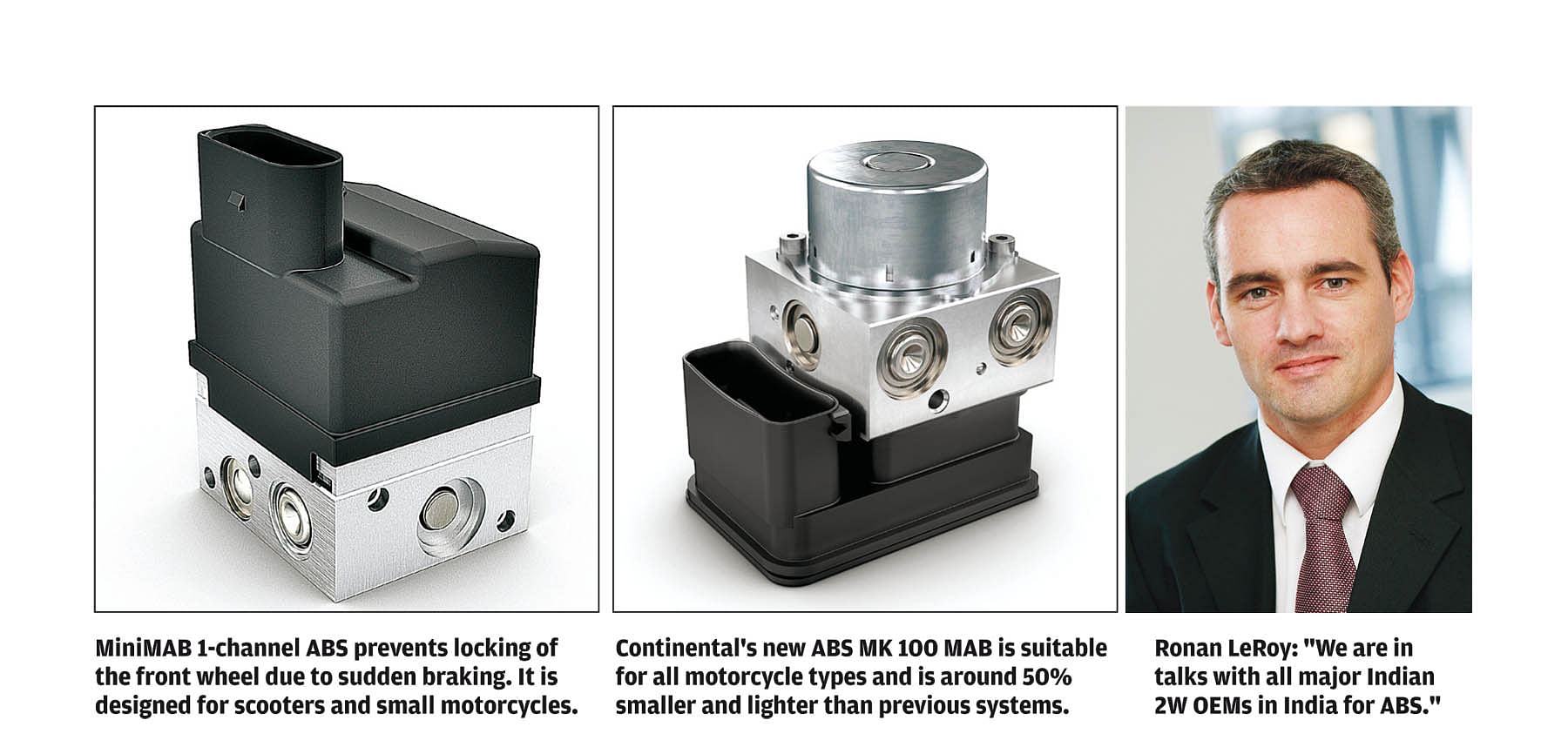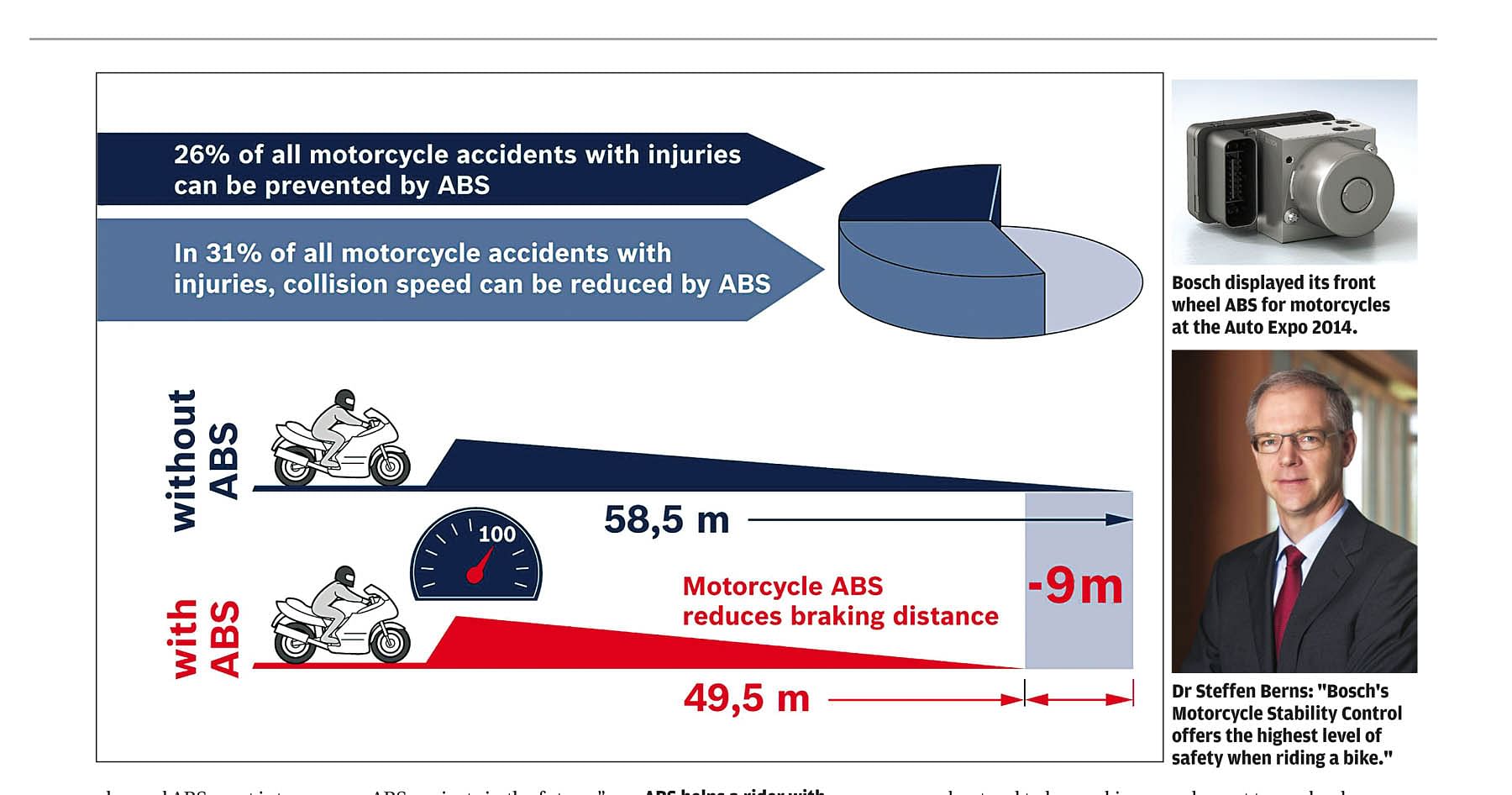Two-wheeler ABS: big-ticket opportunity in India
Around 30% of road accident fatalities in India comprise 2-wheeler users. With mandatory fitment of ABS, this grim statistic can be reduced. This life-saver will also translate into business for suppliers, says Amit Panday.
Around 30 percent of road accident fatalities in India comprise two-wheeler users. With mandatory fitment of the anti-locking braking system, this grim statistic can be reduced. This life-saver will also translate into business for suppliers, says Amit Panday.
According to a recent report named ‘Decade of Action for Road Safety 2011-2020 by the World Health Organisation (WHO), close to 1.3 million casualties happen in road traffic crashes worldwide every year, and injure 25-50 million more. The report mentions that while over 90 percent of road traffic deaths and injuries occur in low-income and middle-income countries (they account for 48 percent of the world’s total registered vehicular population), these injuries have become a leading cause of death for people aged 15-29 years, an age group that particularly moves on two-wheelers.
“Nearly half (46 percent) of those dying on the world’s roads are vulnerable road users, which are pedestrians, cyclists and motorcyclists,” states the report. It estimates that if preventive measures are not taken, then the total road traffic casualties may go up to 1.9 million people annually by 2020.
In an accident research report presented by Vijay Ratnaparkhe, president and managing director, Robert Bosch Engineering and Business Solutions India, last year, highlighted that around 137,572 fatalities took place in road traffic accidents in India in 2013, and of these 29 percent comprised road users who were riding two- wheelers. In numbers, this amounts to 39,896 casualties only from two-wheelers in India.
2-WHEELER RIDERS' LIVES AT STAKE
Casualities to two-wheeler riders top the list of all on-road fatalities across various modes of transportation ranging from passenger cars, three-wheelers, buses and other motor vehicles. Bosch’s study, based on the Road Accident Sampling System - India (RASSI) database, points out that as many as one-third of two-wheeler accidents can be avoided if they are equipped with anti-lock braking systems (ABS). Hence, the introduction of mandatory helmets and mandatory ABS on two-wheelers can easily make a difference to this growing number.

However, the shocking fact is that both vehicle owners and most state governments in India don't take safety seriously. While France made helmets mandatory for two-wheeler users in early 1970s, multiple state authorities in India are yet to implement that. Further, it is known that ABS systems will be mandatory for 125cc and above motorcycles in Europe from January 1, 2016; India will possibly make it mandatory only fiscal 2017 onwards.
MANDATORY 2-WHEELER ABS
JP Research, a statistical consulting firm that investigates road crashes, along with a few other RASSI consortium members such as Bosch, Daimler, Renault, Nissan, Hyundai, and others, is a prominent name that has been backing the need for ABS systems on two-wheelers for some time.
In December 2014, Autocar Professional, in a nationwide exclusive, revealed that the Automotive Research Association of India (ARAI), the research authority of the automotive industry under the
Ministry of Heavy Industries and Public Enterprises, government of India, was working on a proposal for the ministry to make ABS systems mandatory for two-wheelers with an engine displacement of 125cc and above.
In an interview to Autocar Professional, Rashmi Urdhwareshe, director, ARAI, had at the time said: “The government is very keen on bringing ABS on two-wheelers now. While at the moment the ABS technology (for two-wheelers) is expensive, the Ministry feels that stability of the vehicle should be given more importance.”
The ministry later agreed to the same and the mandatory requirement will see implementation 2017 onwards.
HUGE OPPORTUNITY FOR ABS SUPPLIERS
The massive two-wheeler market size in India, and within that the addressable ABS market, is clearly a big-ticket opportunity staring in the face for ABS module suppliers. A quick check of Indian industry vehicle data indicates that the market size of only motorcycles with an engine displacement ranging between 125cc to 800cc (a category currently relevant for ABS systems for motorcycle manufacturing operations in India), stood at 21,01,941 units in FY2014-15. The actual number would be even larger as this does not include scooters and motorcycles with engine displacement of exactly 125cc that were sold in India during the last financial year.
Two German component suppliers – Continental Automotive Components India and Bosch India – are at the forefront to address this upcoming demand. While Continental was the first company to supply two-wheeler-specific ABS in India to the TVS Apache (a two-channel system), Bosch has now supplied its single-channel ABS system to Bajaj Auto for its recently launched Pulsar RS 200 model. Interestingly, Bajaj Auto has priced the ABS variant of the Pulsar RS 200 Rs 12,000 more than the non-ABS variant of this model.
LOW-COST SINGLE-CHANNEL ABS
The single-channel ABS system, fitted on the front wheels of a two-wheeler, is the latest low-cost ABS technology that is highly relevant for cost-sensitive markets like India. An official communication from Bosch explains that “in India and other emerging markets in Asia and South America, motorcycles from the lower price segment are an important means of transportation. In most cases, only the front wheel of the motorcycles in these markets (up to 500cc) has hydraulic brakes for cost reasons. In contrast, the rear wheel is fitted with a mechanical cable brake. Front-wheel ABS addresses this technical configuration.”

“In motorcycles over 200cc (premium category) in India, ABS is commonly offered as a variant,” adds Ronan LeRoy, head of two-wheeler, vehicle dynamics business unit of Continental’s Chassis & Safety Division (pictured above).
Continental’s first single-channel ABS went into series production in April 2014 for Piaggio’s Vespa models.
“Continental’s Bangalore-based Technical Centre India (TCI) is focused on the area of electronic braking systems, specifically on solutions such as MiniMAB (one-channel ABS) for smaller motorcycles and scooters. Based on its proven ABS technology for passenger cars, this technology has been specially developed for cost-sensitive markets such as India. There is a dedicated motorcycle team in our tech centre to handle a range of functions including full project management responsibility, vehicle testing, electronics and software development to support customer projects. In addition, this team is an integral part of the global team for core development activities. At present, we are in discussion with all major Indian two-wheeler manufacturers for the ABS project. Continental is a major contender for prospective two-wheeler ABS projects in the future,” says LeRoy.
Continental also offers a two-channel (MK100) and a three-channel (MK 3-2 MAB) ABS system for greater stability of two-wheelers. The company has also developed motorcycle integral brake (MIB) system, which enables both the brakes (front, rear) when the rider applies only the front brake (similar to Honda’s popular combi-brake system).

“We’re introducing ABS technology into all classes and markets that need it,” says Dr Steffen Berns, managing director Bosch Ltd and president of Bosch Group in India.
A press release from Bosch says, “Front-wheel ABS represents the starter version of the current ninth generation of motorcycle ABS. The variant ABS base is geared toward motorcycles with hydraulic brakes on the front and rear wheels. The next step up is ABS plus with an integrated pressure sensor. It lives up to the demands of high-performance two-wheelers.” Bosch is understood to be working with Bajaj Auto for ABS on a number of other models as well.
Working on motorcycle stability control (MSC), Bosch has developed a solution that recognises the lean angle of two-wheeler and instantly adapts the electronic control interventions during braking and accelerating to the riding situation.
“MSC currently offers the highest level of safety when riding a motorcycle,” Dr Berns says. According to analyses based on the German accident database GIDAS, a feature like MSC can exert a positive influence on two-thirds of all motorcycle accidents in bends that are caused by rider error.
ABS: THE LIFE-SAVER
Today’s India, which is making speedier moves than ever before to expand its road network across the country, is faced with a serious dichotomy. While it is favourably placed as one of the world’s fastest growing passenger car markets and the second largest two-wheeler manufacturer, the number of road accidents recorded each year is one of the worst globally.
Other than the massive loss of human life (137,423 deaths in 2013) and injuries in road accidents (469,882 injured in 2013) in India, there is a resultant economic loss to the country. The SaveLife Foundation, a Delhi-based, independent, non-profit organisation working to improve road safety and emergency care across India, has said that the Planning Commission in a 2014 report had estimated that the annual cost of road crashes in India could be around 3% of GDP.
At the core of this grave reality is the lax attitude towards safety, amongst other causes such as poor road conditions, unexpected obstacles, lack of road discipline and slow-moving legislations. The move to make two-wheeler ABS mandatory in India from 2017 is laudable and suppliers would do well to be geared to cater to upcoming demand.
RELATED ARTICLES
Mahesh Babu’s Drive to Make Olectra’s EV Math Add Up
Mumbai’s electric bus operations reveal gaps between tender assumptions and real-world conditions, impacting energy use,...
BKT, the ‘Off-Road King,’ Chases the Consumer Market
The company has unveiled a broad range of tyres for the Indian two-wheeler and CV markets.
RSB Group Prepares for Hyper-Growth: New Markets, Tech and Mission ₹10,000 Cr
From a small workshop in Jamshedpur to an engineering group with global reach, RSB Transmissions is preparing for its mo...






 By Amit Panday
By Amit Panday
 05 Aug 2015
05 Aug 2015
 15967 Views
15967 Views








 Shahkar Abidi
Shahkar Abidi



 Darshan Nakhwa
Darshan Nakhwa

